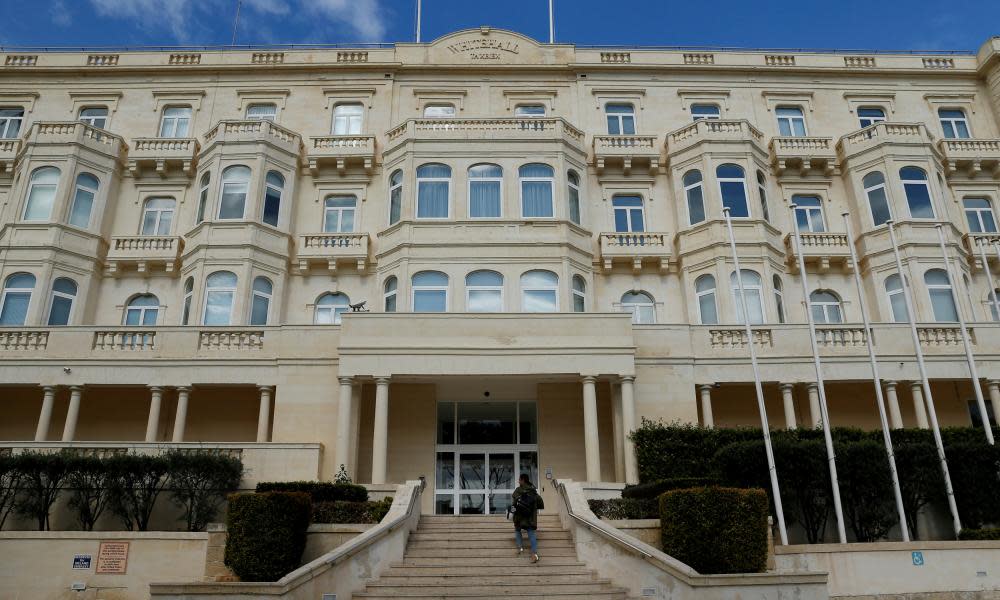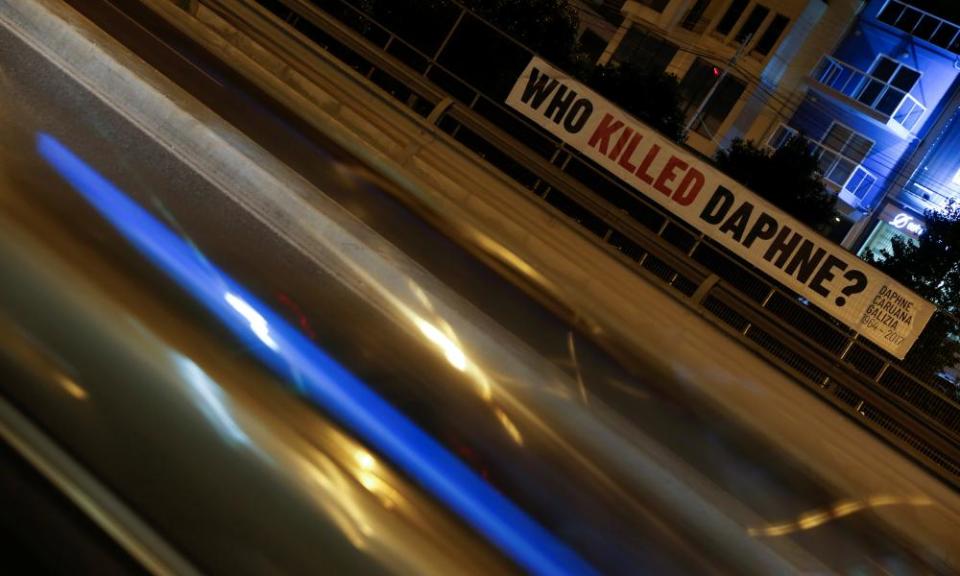Authorities seize control of bank at center of Malta corruption scandal

Maltese authorities have seized control of a bank at the centre of a corruption scandal that was exposed by the murdered journalist Daphne Caruana Galizia.
Malta’s banking regulator has frozen all transactions for customers, executives and shareholders at Pilatus Bank with immediate effect following the arrest and indictment in the US of its Washington-based Iranian owner, Ali Sadr, who was charged on Tuesday with money laundering and evading sanctions.
Pilatus, which reported €308 million of assets in 2016, has been the subject of intense controversy in Malta and was known to have held accounts for a top official in the government of the prime minister, Joseph Muscat, and members of Azerbaijan’s ruling family.
The Malta Financial Services Authority announced within hours of the indictment that it that it had removed Sadr as a director of the bank and suspended his voting rights.
The MFSA said it was also barring Sadr and any other directors or top executives from withdrawing funds from the bank. Pilatus must also obtain approval before being able to transfer any of its own capital.
Amidst confusion over whether all Pilatus accounts had been frozen, the regulator issued a second notice on Wednesday evening stating no customers could move money without its permission. “The Bank has been directed not to transact any business whatsoever irrespective of the client or the counterpart,” it warned.
Sadr is charged with a six-count indictment that alleges he participated in a scheme to illegally funnel $115m in payments from Venezuela to Iranian individuals, in violation of US sanctions and anti-money laundering rules.
The criminal charges raise significant new questions about Pilatus’s future operations. The US investigation was initiated in 2013, authorities said.
Pilatus opened an office in Mayfair, London, in April 2017 after being granted a “passport” to operate in the UK by the Maltese regulator. However, British banking watchdogs have never granted it permission to open accounts for UK resident customers.
A spokesperson for Britain’s Financial Conduct Authority said: “The FCA is aware of the issue and has been actively engaging with the firm, the home state regulator the Malta FSA and the PRA [Prudential Regulation Authority]. The firm is passporting in from Malta under the Capital Requirements Directive but has not opened for business in the UK. We will continue to monitor the situation closely.”
The development poses questions about how Sadr, who is the son of one of Iran’s richest men, came to win – and keep – a banking licence in the Mediterranean country.
The bank was the subject of a detailed investigation by Malta’s anti-money-laundering agency, the FIAU, in 2016. The FIAU alleged in a report that the bank showed a “glaring, possibly deliberate disregard” for money-laundering controls. Pilatus has said in the past that it denies any wrongdoing and fully adheres to all laws and regulations.
Pilatus did not respond to a request for comment. The bank was not named in the criminal indictment and has not been accused of wrongdoing by US authorities.

But the charges against Sadr have bolstered critics of the bank.
David Casa, a Maltese MEP who is a frequent critic of Muscat, said in a letter to the chair of the European Banking Authority, that the indictment called for a further investigation into Pilatus.
He also called on the EBA to examine whether Malta’s chief banking regulator, the MFSA, was aware of Sadr’s alleged criminal activity and whether the decision to grant the bank a banking licence was the result of favourable political interference by an official within the Muscat government.
He pointed to an allegation by the FIAU that Keith Schembri, Muscat’s controversial chief of staff, had received questionable payments, which originated from Russian nationals, into a Pilatus account that was held in Schembri’s name.
Schembri has said the payments were a legitimate repayment of debts from a friend and has denied wrongdoing.
Caruana Galizia, who was killed in a car bomb in October, was being sued by Pilatus for defamation and for causing damage to the bank’s reputation at the time of death. The lawsuit was later dropped.
Caruana Galizia had made a wide range of enemies, reporting on a political system rife with corruption, businesses seemingly used to launder money or pay bribes, and a criminal justice system that seemed incapable, or unwilling, to take on the controlling minds behind it all.
Caruana Galizia’s three sons – Matthew, Paul and Andrew – welcomed the news that criminal charges would be considered by a court.
“We wish our mother could have been alive to see it happen,” the brothers said.
The US case against Sadr was brought by the US Department of Justice and by local law enforcement officers in the district attorney’s office in Manhattan.
In court documents, prosecutors have alleged that Sadr – who is referred to as Ali Sadr Hashemi Nejad – skimmed $115m of a nearly $500m Venezuelan construction contract through the US banking system. He is alleged to have used a vast network of front companies and foreign bank accounts to mask Iran’s business dealings in Venezuela, and then used entities in Switzerland, Turkey, and British Virgin Islands to funnel the funds back to Iran.
The court records alleged that a business owned by an Iranian conglomerate called Stratus Group, which was controlled by Sadr’s family, entered into a multimillion-dollar arrangement with the Venezuelan government in 2004 in which they agreed to an infrastructure project to build thousands of homes in Venezuela.
According to prosecutors, Sadr took steps to hide the role of Iranian parties in the transaction as he funneled proceeds from the contract through the US banking system.
In one case, Sadr and an unnamed co-conspirator used passports they acquired in St Kitts and Nevis and an address in the UAE to incorporate two entities outside Iran to receive the dollar payments.
It is alleged that one entity, called Clarity Trade and Finance, was incorporated in Switzerland, while another, Stratus International Contracting, was incorporated in Turkey.
The two entities were used to funnel the dollar payments to an offshore entity in the British Virgin Islands. Clarity also wired $2m in proceeds from the Venezuelan project back into the US, where it was used to purchase real estate in California.
The justice department said that the case was being handled by the terrorism and international narcotics unit.

 Yahoo News
Yahoo News 
